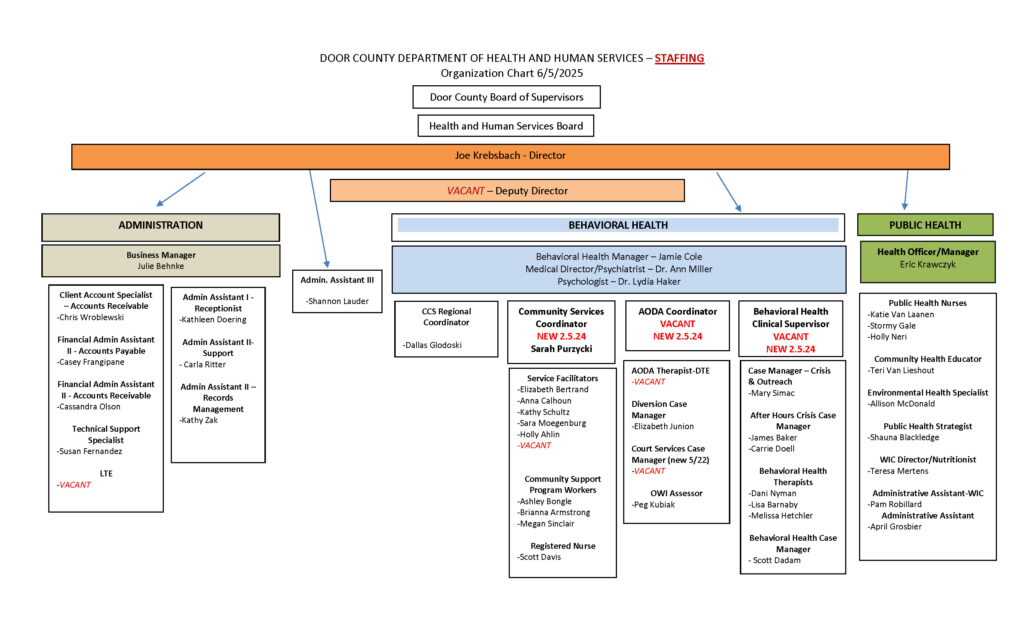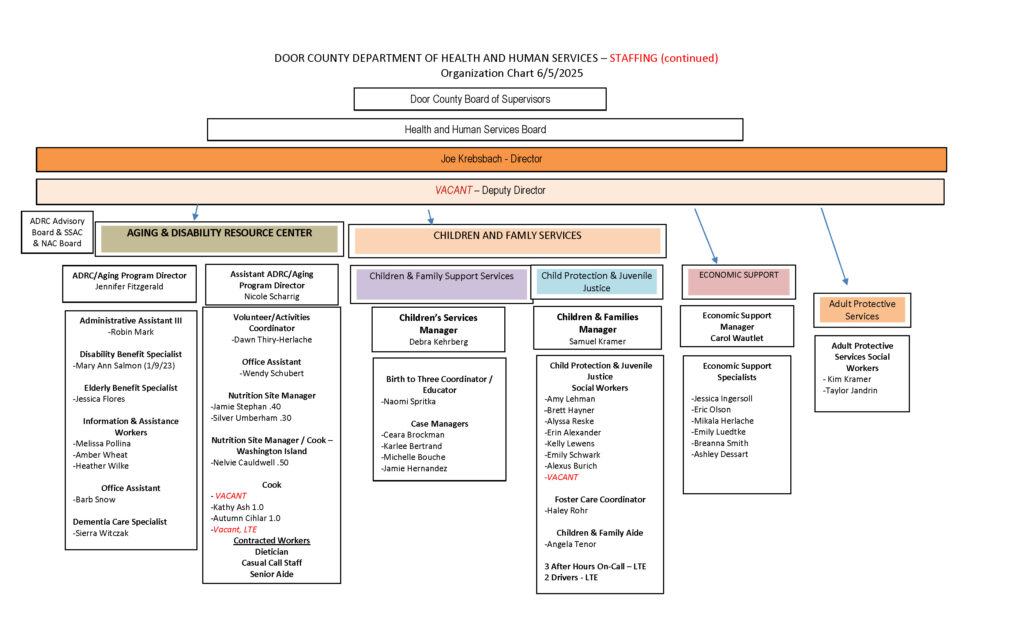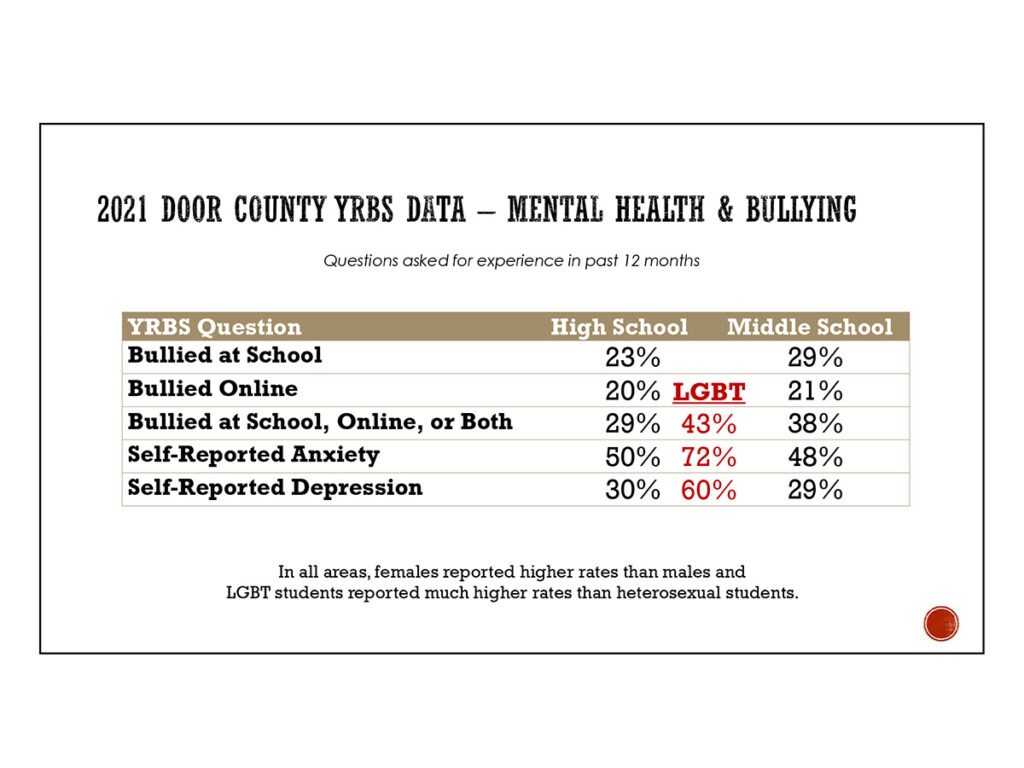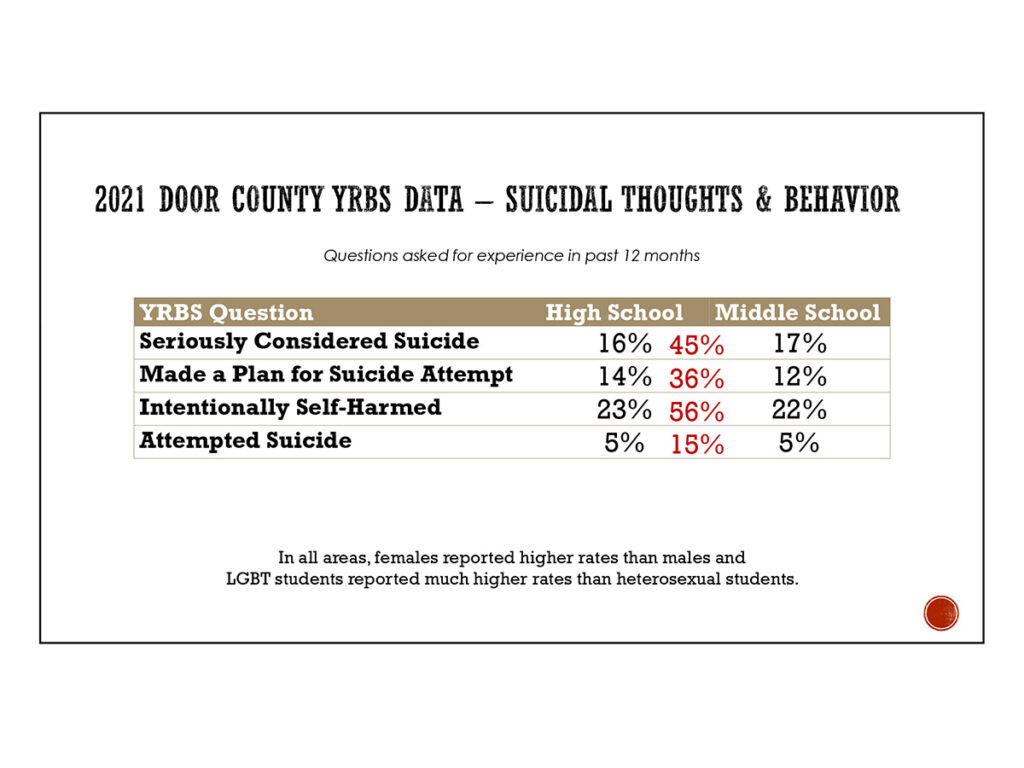The Door County Health and Human Services Department has been struggling with staff vacancies for several years. In response, existing staff has taken on extra duties and made some changes to organizational structure to continue providing services to county residents.
Department Director Joe Krebsbach and Behavioral Health Program Manager Jamie Cole updated the HHS committee on June 9, detailing both good and bad news as the department continues to manage without adequate staffing levels.
There are currently ten vacant positions in the department’s staffing chart, including for a deputy director, an alcohol and other drug abuse coordinator, and a behavioral health clinical supervisor. There are also three vacancies Krebsbach said are not even listed on the chart because the department cannot fill them until a clinical supervisor is hired.
The department has state and federal grant funding for some of the unfilled positions, Krebsbach explained. These grants would pay for a therapist for Drug Treatment Court and an additional therapist for diversion programs.
The department has the budget for more staff, but it does not have the ability to provide them with supervision, according to Krebsbach.
“We need a therapist with the heart of a teacher,” he said. The job requires someone with clinical experience and the ability to guide other clinicians.
It has been vacant since summer 2023 and filling it is “hugely important,” he said in his staffing update to the committee.
“When we bring people in, they’re young, inexperienced, they need a lot of supervision,” Krebsbach said. “(Without a clinical supervisor) we just don’t have the infrastructure.”
As far as the grant funding, there is potential the department could lose that funding if they do not use it, Krebsbach said in a follow-up discussion. Even though state offices have been “very understanding,” the department has to reapply for the grants every year, he said, and continuing to request money without spending it would make it less likely to get the funding in the future.


A shortage of mental healthcare providers is not a problem isolated to Door County, Krebsbach said, but one his counterparts in other Wisconsin communities are also facing, especially in rural areas.
The department is doing the best they can, according to Krebsbach, and Cole has been covering both the administrative work her position requires and the “gamut of all the other programs.”
The department is planning to hire a recruitment firm to aid in finding a clinical supervisor and potentially filling other vacancies, he said, as well as looking again at staff structure and job responsibilities.
Sober living house manager to leave
In a brief and tearful address to the Door County Health and Human Service Committee during its public hearing on June 9, Stephanie Short explained why June 10 would be her last day in her position as facility manager of the county-funded women’s sober living house in Sturgeon Bay.
“I’ve come to realize it is time for me to pass that role on, that being in a position of authority does not align where my heart is. Health and wellness, coaching, advocacy and working with people in a more collaborative, empowering way,” she said. “I hope you guys will still support it.”
Short was employed by CORE Behavioral Health Services, the company contracted by the HHS to run a women’s sober living house that opened last fall.
Short expressed gratitude to the department for giving her the opportunity, and said she will transition to full-time work with the United Way of Door County and continue her personal wellness and coaching business. She will also maintain her contract to provide peer support for the department.
Short is a Wisconsin state-certified peer support specialist. Peer support is an evidence-based and non-clinical form of mental health and substance use disorder treatment. Specialists have lived experience of mental health and substance use challenges, and provide understanding, encouragement and guidance. They work in conjunction with clinical treatment.
Two residents are in the sober living house right now and have been there for a few months, Krebsbach said. Another CORE staff member is taking over Short’s house manager position while the company tries to permanently fill it.
Two other women are still in residential treatment programs and are candidates to move into the sober living house when they finish those programs, he said.
The need for a men’s sober living home has grown in the last year, according to HHS reports.
A house owned by the county, located near the Justice Center, was originally purchased for convicted sex offenders, under Chapter 980, a 1994 state law. Right now there are no Chapter 980 offenders living at the house, so HHS is using it to house two men who have recently finished residential treatment and are receiving outpatient counseling and case management, according to Krebsbach.
Chapter 980 allows for certain convicted sex offenders who are near the end of their prison term, to be declared “sexually violent persons” and subject to a minimum 12-month confinement and treatment program, called “supervised release.”
In 2018, the state required that Chapter 980 offenders must serve their supervised release in the county where they were convicted. Counties were also made responsible to provide housing.
SUD clients residing in the Chapter 980 house is not a sustainable situation, as the department does not have adequate staff to supervise the house long-term, and if a Chapter 980 offender is granted release, the residents will need to vacate the home. There is usually at least a couple months’ notice were that to happen, Krebsbach said.
“If we are going to have a male sober living house long term, we need another option,” County Board Supervisor Ryan Shaw said. Shaw represents District 9 in the City of Sturgeon Bay and serves on the HHS committee.
Some successes, some ‘band-aids’
Even with staffing struggles, Cole said the department is providing services to clients, and she was proud of their crisis center work in particular. The county crisis line received 272 calls this year so far and only had to mobilize crisis workers to respond to 38 of those calls, she said.
“They’re doing a really excellent job triaging on the front end, doing safety planning and assessing,” according to Cole.
Despite best efforts, the behavioral health program has a waiting list of 55 clients, she said, and it is taking at least a few months to get many of those clients services. There is a priority designation by state statute for clients who are pregnant intravenous drug users; intravenous drug users; people coming out of crisis, detox or inpatient facilities; HIV positive people; and anyone experiencing suicidal thoughts.
“There’s a lot of priority clients coming through,” Cole said. “Whether it’s kind of bumping our schedules around just to figure that out, but we have 14 days to get people in who are on that priority list, and often we’re getting them in the same week. We are doing a good job on that side of things.”
The department is providing outpatient services as well for mental health and AODA programming, including an AODA group twice a week, an intoxicated driver program, medication management, psychological testing, as well as some extra programming for clients who “don’t quite fit anywhere,” Cole said.
The department is unable to respond effectively to some issues, including homelessness, according to Cole. She described an individual experiencing homelessness who recently walked into the office seeking services.
“Those are the toughest, I think, for our community because we don’t necessarily have more than a band-aid sometimes to get them through,” she said. Some level of case management and check-in helps, but HHS does not have access to many resources. Gas and gift cards only go so far, and, in cold weather, hotel rooms are available, but nothing is a long term solution.
“It’s beyond Health and Human Services,” Cole said, and explained community partners are critical to addressing the particular need of homelessness.
Cole also reported that due to staffing vacancies, the Drug Treatment Court is still not taking any new clients and focusing on getting the 10 current participants through the program.
Community health survey launched
The Door County public health department is sharing an intern with United Way of Door County to assist with launching a 2025 Community Health Assessment, according to Shauna Blackledge, public health strategist.
Wisconsin health departments are mandated by state law to perform a health assessment every five years. A survey, community conversations and stakeholder interviews gather data, Blackledge said.
The goal of the survey is to identify health needs in the community and create coordinated efforts with other organizations and agencies to address them, she said. The report informs policy and budget decisions made by the county and state.
The department would like the 2025 survey to get at least 1,000 participants, Blackledge said. The survey is online, available June through August, and public health staff will be at various events and locations throughout the county to promote the survey, she said.


At May’s county board meeting, District 18 Supervisor Vinni Hancock referenced the report’s findings to justify including an Open Door Pride proclamation request on the board’s June agenda. Her motion was denied in a 13 to 8 vote.
Surveys and assessments like this are necessary to get the government to address issues in the community, according to Open Door Pride member Michelle Hroma, who spoke at both the May county board meeting and the HHS public hearing on June 9.
Public hearing
A couple of community members were on hand at the HHS committee public hearing that took place at the beginning of their regular meeting. Members of the public thanked the committee for inter-agency collaboration and requested support for the local LGBTQIA+ community.
The HHS committee holds annual public hearings “to provide the public with opportunities to offer comments to the Department of Health and Human Services Board members and staff regarding any aspect of the agency administration, programming, or budget for 2026,” according to the committee agenda.
Amy Kohnle, United Way of Door County director, spoke to the committee, mostly thanking them for supporting and collaborating with United Way on shared priorities such as digital access, child care, alcohol and drug use, screen time health, and the Partnership for Children and Families. (Disclosure: Kohnle is a donor to Knock.) United Way also grants money to many of the same organizations HHS supports, she added.
Michelle Hroma, representing Open Door Pride, called on the HHS committee to encourage them to prioritize the LGBTQIA+ community of all ages in Door County in 2026.
Negative mental health outcomes for LGBTQIA+ young people, particularly in rural areas, are higher than their straight cisgender counterparts. She asked that the department “target and design resources” specifically for LGBTQIA+ youth living in rural areas.
According to the latest available data collected by a 2021 Door County Youth Risk Behavior Survey, 43 percent of all LGBTQIA+ youth who responded have been bullied in the past year compared to 29 percent (high school) and 38 percent (middle school) of their straight cisgender peers.
72 percent reported anxiety, and 60 percent reported depression compared to 50 percent and 30 percent (high school) respectively. 15 percent of LGBTQIA+ respondents attempted suicide versus 4 percent of straight cisgender youth in high school and middle school.
“With its ‘prevention focus’ in mind, I think that there are efforts that this department can take to show that it can walk the walk of its mission statement,” Hroma said. “For example, it can bring forward an amendment to the county board rules of order so that a Pride Month proclamation can be brought forward, and it can educate the county on its importance.”
Supervisor Ryan Shaw asked what would be the best way to bring this discussion forward to the administrative committee or county board as a whole.
“I think we’re supportive of it, but I don’t decide,” Krebsbach responded. “I do think the committee can make a recommendation and bring that to the county board.”
District 10 Supervisor Phil Rockwell, representing parts of Sturgeon Bay, responded to Hroma’s request with one of his own, that members of the Door County community who have been attacked in any way, report to local law enforcement. He said he received phone calls and emails from constituents over the last week since the May county board meeting, describing attacks on LGBTQIA+ community members.
According to local law enforcement, there have been no reports of attacks on LGBTQIA+ residents in Door County since 2002, Rockwell said. “We need statistics” in order to be able to take action, he added.
Shaw and District 12 Supervisor Nissa Norton, both representing parts of Sturgeon Bay, commented that many victims do not report crimes, and an attack can be any number of things, from verbal harassment, to threats, to physical assault.

